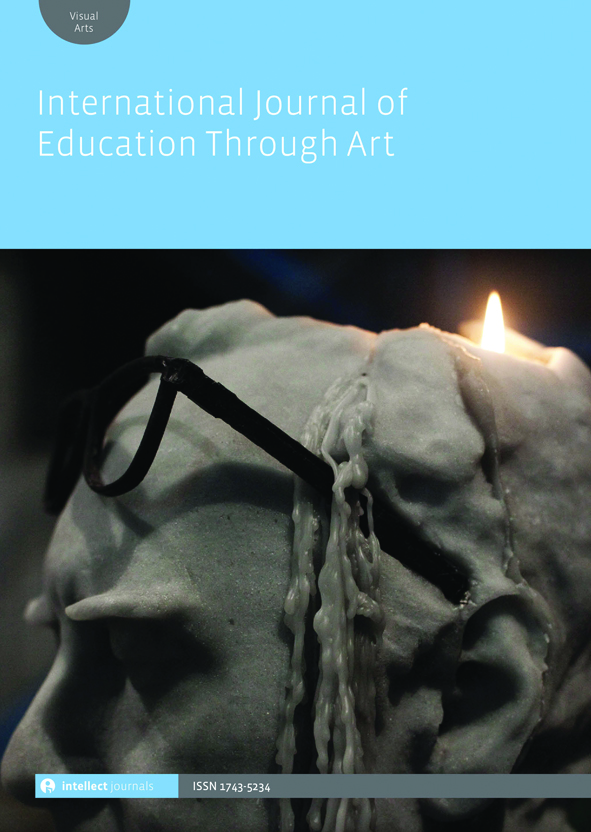Vol. 8 No. 1 (2012)

IJETA 8.1 Contents
For access to the articles click here.
If you are a member of InSEA, you are entitled to full, free access to IJETA from Vol 7 No 3. To access sign into the members section of the InSEA web pages
EDITORIAL
Authors: Glen Coutts
Page Start: 3
Title: The identities of an arts educator: Comparing discourses in three teacher education programmes in Finland
Authors: Miia Collanus And Seija Kairavuori And Sinikka Rusanen
Keywords
arts education,craft education,critical pedagogy,identity,teacher education,visual arts education
Abstract
The aim of this research was to find the structures affecting the construction of an arts educators' identity. We compare the subject areas of visual art and textile craft in three different teacher education programmes: the kindergarten teacher, classroom teacher and textile teacher education at the University of Helsinki. Drawing from critical pedagogy, we approach teacher identity as a subject position constructed discursively in particular social and historical contexts. Our data consisted of 152 essays and portfolios from pre-service teachers. Using articulation as our research strategy, it was possible to identify two (meta) discourses positioning an arts educator: the discourse of technical knowledge and skills, and the discourse of self-expression. We suggest this tensioned discursive space could serve as a starting point for further research, and that the critical engagement with meta-level knowledge of the subject areas should be given more attention in teacher education.
Title: Environmental education through art
Authors: Susana Tereso
Keywords
art,education,creativity,sustainability,well being,creative workshop
Abstract
The work presented in this article aims to examine different approaches to experiencing the relationship between art and nature as a model of sustainability. The objectives include the enhancement of sensibility – senses, emotions, feelings, affections – as a way to directly experience the well-being promoted by joining art and nature, including harmony, beauty and diversity. The importance of the natural cycles is revealed by focusing on the light and colour during the day. Scientific knowledge is associated with the hands-on approach to achieving a superior consciousness. Different methodologies relating education through art psychopedagogy, the creative workshop and the experience and knowledge of the natural environment are created. The ultimate goal is to generate new ideas and creative procedures for joining individual well-being with global sustainability. The experiences developed in a natural reserve were applied in rethinking the city as a common space where human beings and local nature are joined to build a superior way of living.
Title: Towards developmental self-assessment in the visual arts: Supporting new ways of artistic learning in school
Authors: Diederik W. Schönau
Keywords
developmental self-assessment,art education,competences,twenty-first-century skills
Abstract
Education in and through the arts has a long history in defining its educational goals and the best means to reach these goals. This has generated an enormous diversity in goals and means that threatens to obfuscate the essential contribution of the arts to the education of all children. This essence - learning to give form to meaning – should be central in compulsory education, as it addresses fundamental skills that are part of the human cognitive system. Instead of focusing on the quality of the art products, more attention should be given to the competences needed to give form to meaning. The concept of developmental self-assessment is introduced to focus on the acquisition of these competences.
Title: Transplanting Froebel into the present
Authors: Wendy Strauch-Nelson
Keywords
Froebel,kindergarten,nature study,creative self-activity
Abstract
Friedrich Froebel created the kindergarten and in doing so initiated a pedagogy rooted in creative self-activity that helped prepare the path for art education in schools. The purpose of this article is to look back at the lasting influence Froebel's principles have had on art education. I will identify and examine six fundamental ideals that Froebel introduced. Next, I will compare these to the results of recent research in science fields that are dedicated to educational research. Special attention is then given to the issue of nature study in the context of recent literature concerning the relationship of children and the natural world. Finally, I will present questions that may further the dialogue regarding the suitability of Froebel's philosophy for today.
Title: Young people's encounters with museum collections: Expanding the range of contexts for art appreciation
Authors: Makoto Ishikawa
Keywords
museum collection,art appreciation,school,contemporary art,calligraphy
Abstract
This article reports on attempts to expand the range of contexts for art appreciation through practical school–museum collaboration. Since various arts require various ways of being viewed, I encouraged opportunities for youngsters to encounter art in ways they had not previously experienced in their classrooms. Focusing on contemporary art, photography and calligraphy, my students and I endeavoured to expand appreciation activities in terms of modern, contemporary and traditional art, by conducting a number of 'practice trials', four of which are considered in this article. One example is the art project on the wider appreciation of calligraphy, which is taught in Japanese language class during compulsory education. Another lies in workshops involving art appreciation and creation with new and traditional media. It was clear to us that arranging art-making as a part of art appreciation programmes helps to engage young people effectively, and also that innovative drawing techniques can be developed using both new media and traditional tools.
BOOK REVIEWS
Authors: Nicholas Houghton And Peeter Linnap And Bryna Bobick
ON CRAFTSMANSHIP: TOWARDS A NEW BAUHAUS, CHRISTOPHER FRAYLING (2011) London: Oberon Books, 144 pp., ISBN 978-1-84943-072-2, h/bk, £9.99
PHOTOGRAPHY AFTER CONCEPTUAL ART, DIARMUID COSTELLO AND MARGARET IVERSEN (EDS) (2010) Oxford: Wiley-Blackwell, 200 pp., ISBN: 978-1-4443-3360-2, p/bk, £19.99, €24.00
UNDERSTANDING STUDENTS WITH AUTISM THROUGH ART, BEVERLY LEVETT GERBER AND JULIA KELLMAN (EDS) (2010) Reston, VA: National Art Education Association, 174 pp., ISBN: 978-1-890160-48-7, p/bk, US$39.00
EXHIBITION REVIEW
Authors: Nicholas Houghton
2011 VENICE ART BIENNALE, GIARDINI, ARSENALE AND VARIOUS OTHER LOCATIONS AROUND VENICE
For access to the articles click here.
If you are a member of InSEA, you are entitled to full, free access to IJETA from Vol 7 No 3. To access sign into the members section of the InSEA web pages
